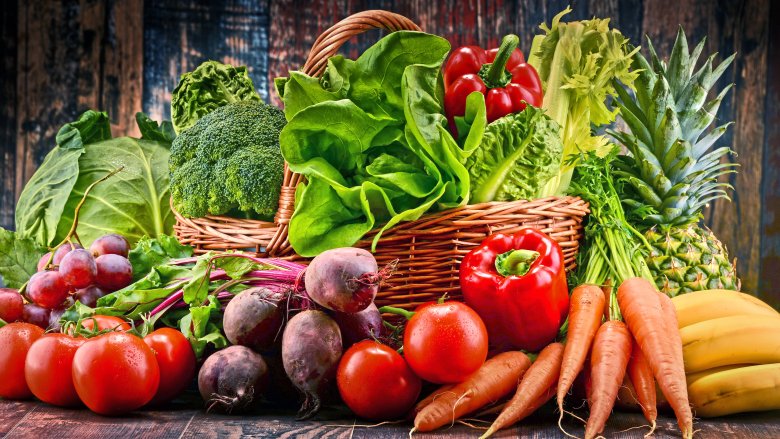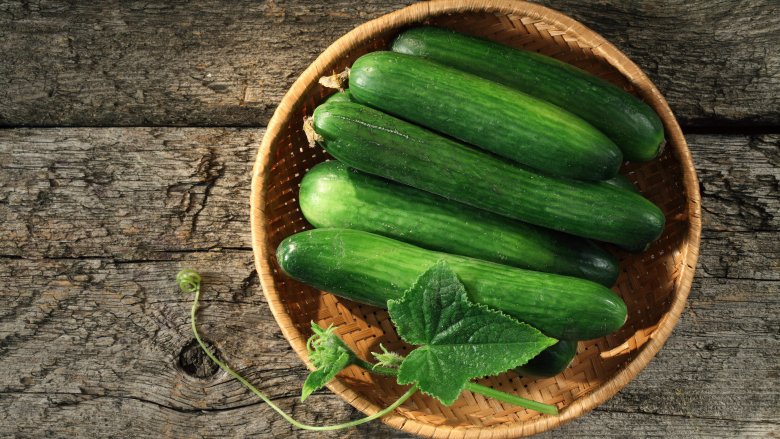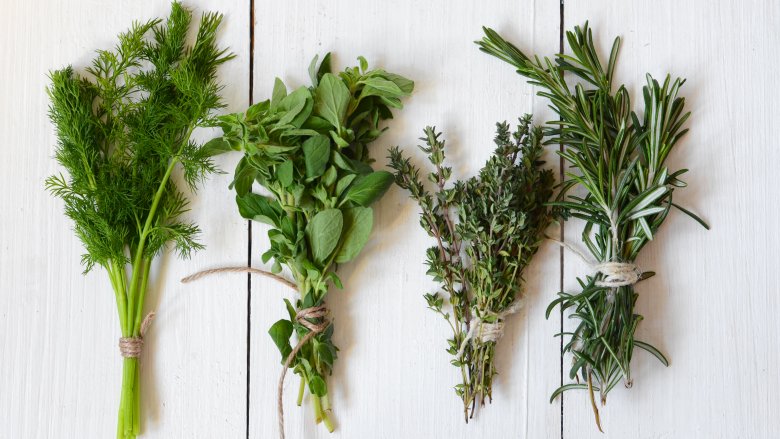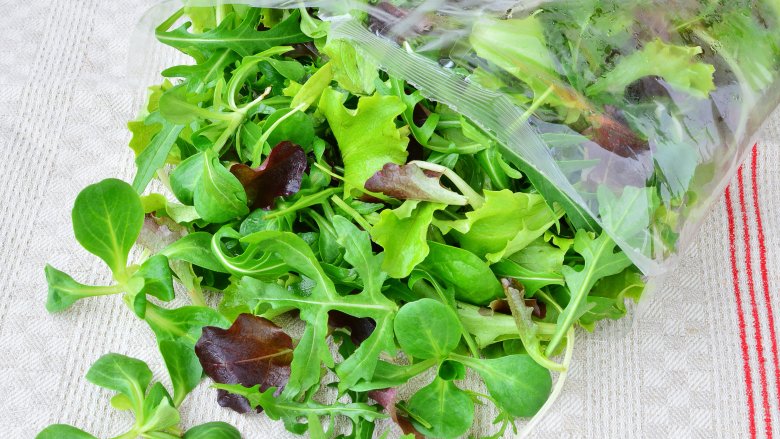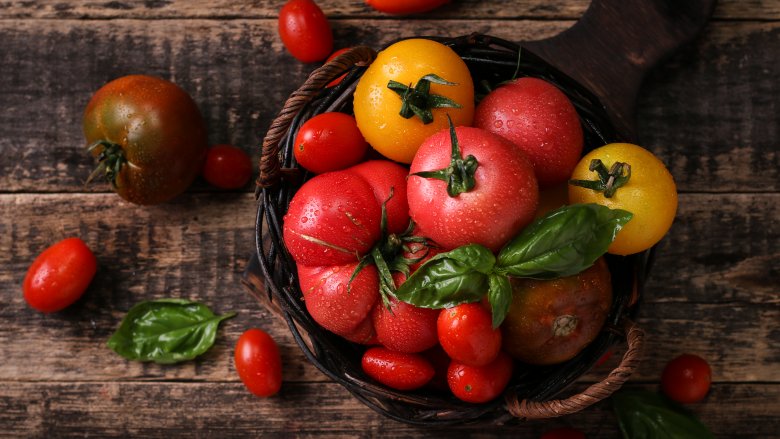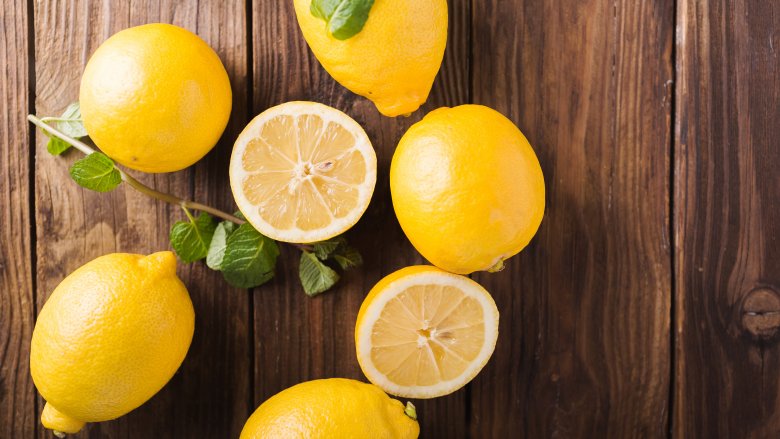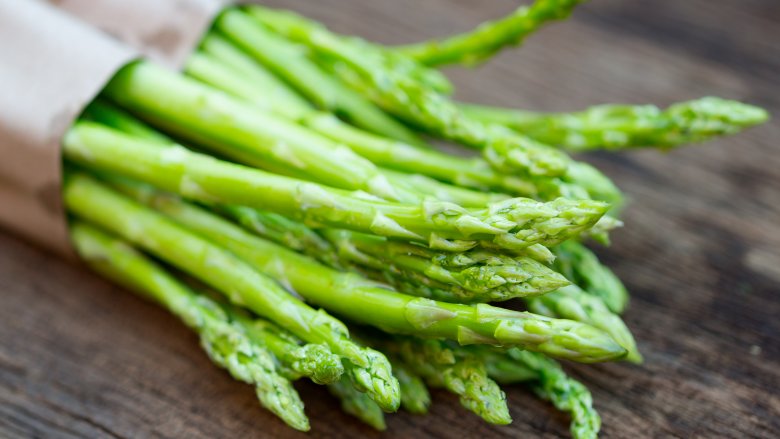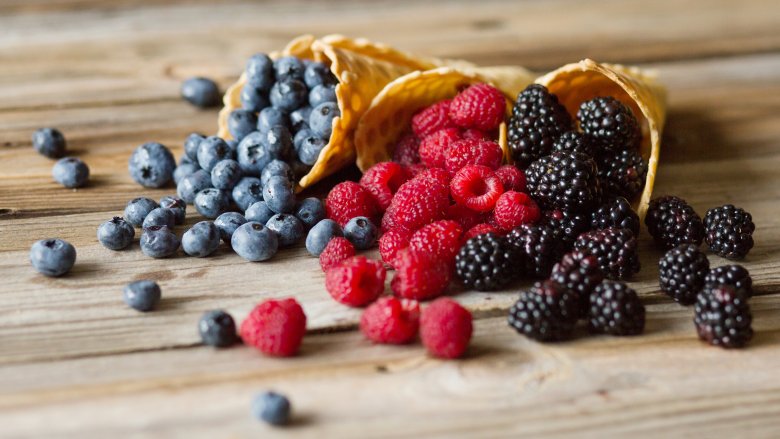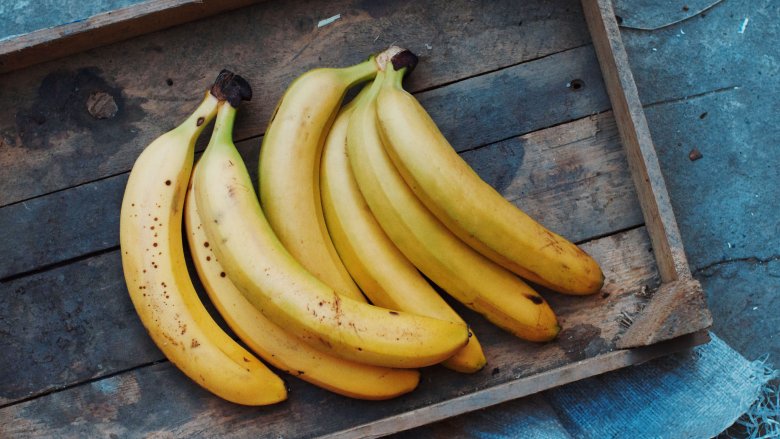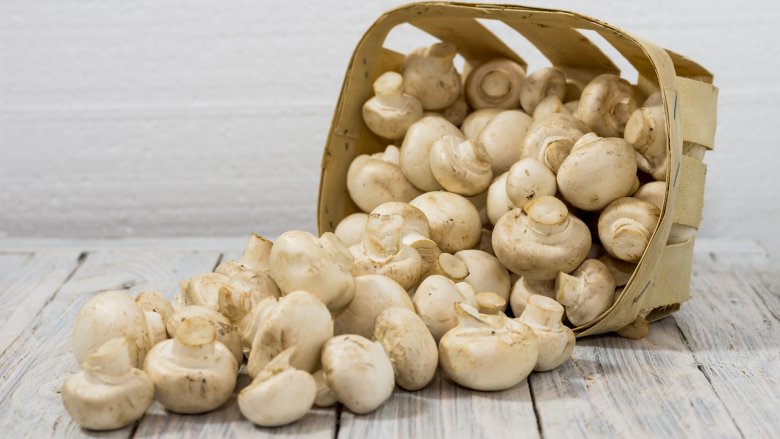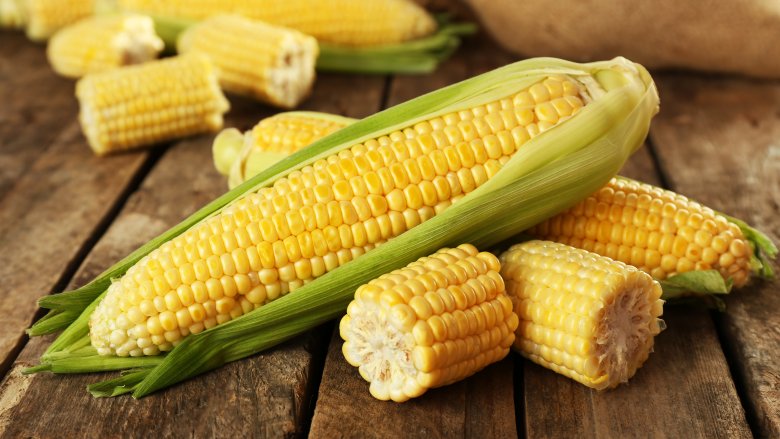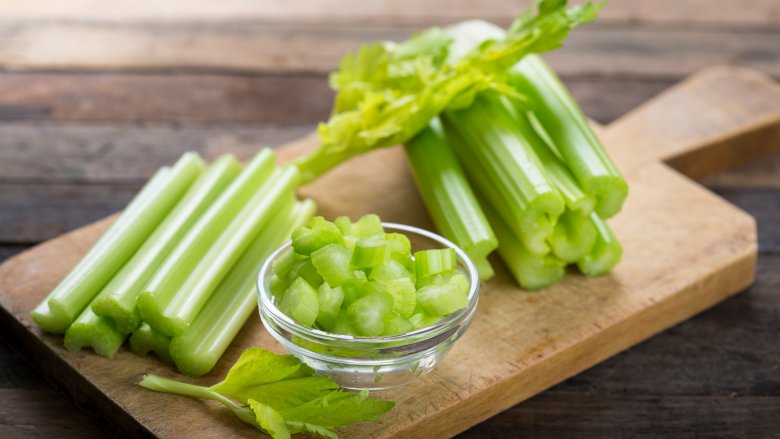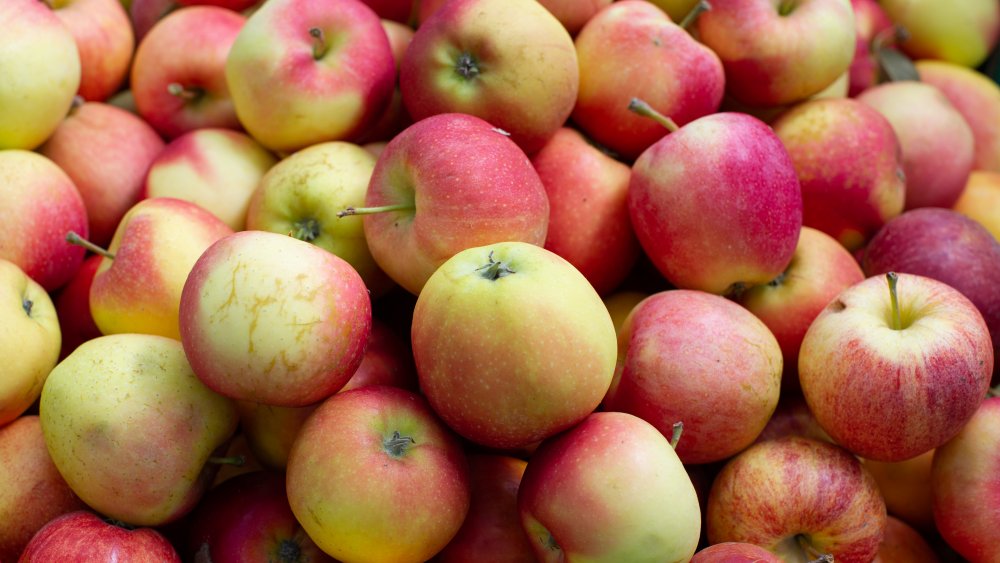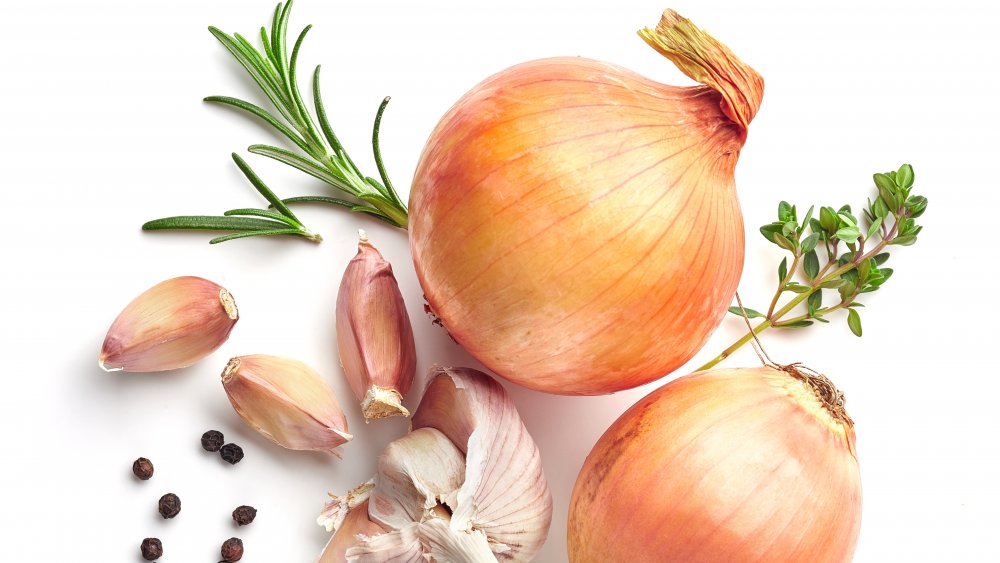You've Been Storing Your Produce Wrong This Whole Time
We've all been there: A trip to the farmers market that results in several more bagfuls of fruits and vegetables than we intended to buy. It's just too hard to resist all that gorgeous produce beckoning to you with its just-picked freshness. So what if you don't really need that pound of salad greens? So what if you have no plan for those six cucumbers? You'll figure it out... won't you?
But now you've gotten your haul home, and the rapture of the market has washed away. The realization sets in that if things go the way they usually go, you'll be tossing slimy greens and liquified vegetables into the trash in a few short days. Because — bad news — even though you have the best of intentions, you've probably been storing that glorious produce all wrong. Good news though — the right way is easy, and it will extend the life of your fruit, veggies, and herbs long enough to let you work through your stash. Just keep these tips in mind next time you overbuy.
Carrots that don't go limp
Carrots are a crisper drawer staple — they can be used to bulk up pasta sauces, stews, and soups; they can be roasted, pureed, and steamed; they can be turned into cake; or eaten as a crunchy snack. But that's the key: Carrots must be crunchy. Nobody wants to gnaw on a bendable carrot.
To keep this hearty root vegetable at its freshest, you have to say goodbye to those beautiful leafy green tops (which can be eaten, contrary to popular belief). The greens only serve to suck moisture away from the carrot, and are also the first to rot. Once trimmed, place the carrots into a zip-top bag, but don't zip it. A closed bag will allow too much moisture to build up, and that means spoilage. Likewise, resist the urge to pre-wash — you want to wait until you're ready to use them to avoid introducing excess moisture. Stored properly, you should have totally unbendable carrots for several weeks.
Cucumbers that don't get mushy
Raise your hand if you've ever inadvertently made cucumber soup in the bottom of the crisper. It seems like the moment you buy them, they're already starting to deteriorate into that trademark slimy green mess. But with a little know-how — and some cucumber coddling — you can slow the process and avoid that crisper soup.
The cucumber's biggest nemesis is moisture, so keeping this produce dry as a bone is key. First things first: Remove plastic wrapping (if any), then wash and thoroughly dry your cukes. Make sure that there are no soft spots, and if there are, abort your mission. There's no sense in storing a cucumber that's already on its way out — adjust your dinner plans and use it right away. If all is good, continue on...
Wrap your very dry cucumbers in paper towels and place them into a plastic bag, leaving it unsealed to allow moisture to escape. And be sure to store the cukes in a not-too-cold part of the refrigerator — the vegetable drawers are the perfect spot. (To store a partially-used cucumber, just wrap the cut end in plastic and continue with the wrapping and bagging as described.)
Herbs that don't wilt
It can be hard to use a bunch of fresh herbs before the dreaded wilt takes over, and one can only make so much pesto. But before you swear off fresh and stock up on dried, try these tricks from Serious Eats to extend the lifespan of all your herbs.
Whether you're dealing with tender or hearty herbs, the process starts the same way: Wash and dry well. Use a salad spinner to get the bulk of the water out, then pat dry (gently!) with paper towels.
- For tender varieties like mint, cilantro, and parsley (more on basil in a minute), you'll need a Mason jar. Put about an inch of water in the jar, trim the bottom of the stems, and place the herbs into the water. Use a plastic bag to cover the entire thing, and secure it with a rubber band around the jar. Store in the refrigerator, and check the water every few days to replace as needed.
- For basil, use the same Mason jar method, but skip the bag cover and store the jar on your countertop instead, out of direct sunlight.
- For hearty varieties like rosemary, thyme, and sage, use a damp paper towel to roll the bunches up, then store in a sealed plastic bag in the crisper.
Depending on the herb, you'll be wilt-free for up to three weeks.
Leafy greens that don't get slimy
So you were feeling extra ambitious about your salad game this week and bought several pounds of greens while you were in the produce section. Now how do you go about storing them so the slime doesn't set in?
Before you do anything else, dump the greens out and comb through for any already slimy or wilted leaves — they'll just kick-start the deterioration process for the rest of the bunch. Next, wash and dry thoroughly (again, a salad spinner works well), then spread the leaves out over thin tea towels or paper towels, ensuring the leaves aren't overlapping much. Now roll the towel up jelly roll-style so that there's a layer of towel between the leaves, and secure it with a rubber band. At this point you can place the bundle in the crisper as-is, or place it in an unsealed plastic bag. The towel should draw any moisture away from the greens, leaving them slime-free and ready to use for about two weeks(!).
Whether you're dealing with salad greens or larger leaves like kale and chard, the process is the same.
Tomatoes that are just the right ripeness
Ah, tomato season — the only time of year when we can ditch those flavorless, out-of-season, pale pink imposters you find in the produce section at grocery stores and sink our teeth into a farm-fresh piece of fruit. Now that you finally have your hands on the good stuff, you'll want to make sure you're storing them right — or risk ruining a perfectly good tomato. But you know the old "never ever ever put a tomato in the refrigerator" advice? Turns out it's wrong. Sometimes, anyway.
If you're lucky enough to have a constant stream of just-the-right-ripeness tomatoes coming through your kitchen, you probably don't need much advice. Just enjoy them, no refrigeration necessary. Should you find yourself with under- or overly ripe fruit, however, take note.
Underripe tomatoes need to be in a warmer environment to continue the ripening process, and should never go into the refrigerator. Leave them on the counter for a few days (stem side down) and they should reach peak deliciousness. But let's say they go past peak deliciousness and are starting to head towards mushy. Get those babies in the fridge, stat! The refrigerator will halt the ripening process and prevent any further deterioration. A warning though: Refrigerated tomatoes need to warm back up to room temperature, or you might notice a loss of flavor. This can take up to two days, so plan accordingly.
Lemons that last
You know that big fruit bowl on your counter that's chock full of bright, shiny lemons that will eventually turn into shriveled rocks vaguely resembling some sort of citrus? It doesn't have to be that way.
Moisture loss is the culprit when it comes to lackluster lemons (are we seeing a theme here with produce preservation and moisture?). Once the moisture starts to go, the citrus starts to wane visibly, and you won't get as much juice out of it either. So, no surprise, all you need to do is combat the moisture loss. Through a series of tests, Cook's Illustrated determined that while unrefrigerated lemons hardened after just a week, lemons stored in a sealed zip-top bag in the refrigerator didn't begin to show signs of dehydration for four weeks. Four weeks. You don't have to be a math whiz to figure out which method is better.
And if you're really committed to that bowl of lemons on the counter, you might want to consider some good fakes.
Asparagus that stays firm
When you're paying something like $4 a bunch for farmers market asparagus, the last thing you want to do is watch it go from firm to flexible while it sits unused in the crisper. So unless you're planning to eat that $4 asparagus the day you buy it, you'd better have your storage method ready. Don't worry, we got you...
Asparagus benefits from a constant drink of water, just like herbs, so you might recognize this method. Just give the ends of the stalks a trim in case they've dried out, then place them cut end down into a cup of water. If you want to take it one step further, you can cover the whole shebang with a plastic bag to get even more mileage out them. Store in the fridge, keeping an eye out for cloudy water and changing it as needed. And just like that, you should have fresh, firm asparagus for at least a week.
Berries that don't get moldy
Is there anything in your refrigerator more fragile than fresh berries? Raspberries seem like they come home from the store already moldy. Ditto for blackberries. And though strawberries aren't quite as bad, they do seem like they start to shrivel within mere hours of purchase. So what's the stay-fresh secret to berries? Thanks to this method from Food52, your berry woes will be a thing of the past.
Start by washing your berries in a solution of one part vinegar and three parts water to get rid of any bacteria, then drain in a colander and rinse well with cold water. Line a salad spinner with three layers of paper towels, then add the berries on top (you may need to do this in batches). Spin until all remaining moisture is gone. (Remember, moisture is what makes these little gems rot so quickly.) For storage, you'll want a plastic container large enough so the berries aren't super crowded. Line that with paper towels, add the fruit, then place the lid only partially on to allow air flow.
You're now officially a berry magician.
Bananas that don't get overripe
Unless you're buying bananas to make bread, you probably don't want every one of the bunch to get super ripe at the same time. Unfortunately, all those genius hacks floating around the internet about separating the bunch and wrapping the stems in plastic to delay ripening don't actually seem to work. But you're not out of luck completely...
Once your bananas achieve the desired ripeness on the counter, you can put them in the fridge to delay further ripening. Just remember — the skin turn will black. This doesn't affect the fruit inside, but if you're looking for an Instagram-worthy banana, you're not going to find one in the fridge. Keep in mind that you only have a couple of days of refrigerated storage — after that the fruit will start to get very mushy. And don't even think about trying it with unripe bananas, unless you want to eat a chilled unripe banana, of course.
Mushrooms that don't dry out or turn to slime
When it comes to keeping mushrooms in the refrigerator, there are two probable outcomes: 1. They will get slimy. 2. They will dry out. How can they do both? Depending on how you're storing them, there's either way too much moisture involved (hello, slime), or there's a lack of moisture involved (hello, dehydration). So how do you properly store this Goldilocks of the fungus world?
First, know that mushrooms should never go in the crisper drawer, no matter what container they're in, or how they're prepped. It's just too damp, which leads to — you guessed it — slime. And no pre-washing either. You think you're saving time, but that added moisture is another slime-inducer.
To make the optimal fungi habitat, place the mushrooms inside a paper bag, then place that bag inside a perforated plastic bag. Store them on the refrigerator shelf away from any strong smelling foods, and your 'shrooms should be happy.
Corn on the cob that doesn't suffer
Corn is another one of those finicky farmers market buys. You have such a small window of time in which to use it or lose it because, after just a few days, all its natural sugars start to turn to starch. On top of that, those sweet kernels also have the propensity to dry out very quickly. And if you're storing your ears wrong, your window just got even shorter.
To give your fresh corn its best shot at greatness, you've got to start at the beginning. Resist the urge and do not pull those husks down to check the kernels. This just kicks off the moisture loss. (You can sneak a peek at the tip, but no more.) With those husks in tact, place the corn in a plastic bag in the refrigerator. That's it. With corn, it's not complicated, it's just a race against time. If you find yourself losing that race, blanch the shucked cobs, then cut the kernels off and freeze them. It might not be quite as good as fresh produce, but it's a close second.
Celery that stays crisp
Celery is another produce staple that tends to lose its luster in a hurry. And while you might be able to get away with using less-than-fresh stalks in a long-simmered soup, you wouldn't dare serve that sad, limp celery on a crudité platter. Luckily, there's a simple solution for all your soggy celery woes — all you need is aluminum foil.
When you buy celery it often comes in a plastic sleeve, and it might seem most convenient to simply put it away as-is. But celery releases ethylene gas, which causes the vegetable to degrade more quickly, and that plastic wrapping is only going to cause you problems when the gas gets trapped within. Aluminum foil, on the other hand, allows the gas to escape. Simply wrap the whole head of celery tightly in foil and refrigerate as usual.
If you like your celery stalks pre-cut for easy snacking, just be sure to use them within two days of cutting for maximum freshness. The old "submerge them in water" trick was proven ineffective by Cook's Illustrated, so no need to bother with that.
Apples that stay crispy
Have you ever bit into a mushy apple and thought, "Delicious?" Yeah, we didn't think so. An apple's crispy, crunchy texture is part of what makes it taste so good, but these qualities fade quickly as an apple continues to ripen — something that happens more rapidly at room temperature. So it makes sense that the secret to keeping apples from overripening is to keep them off the counter.
According to Food and Wine, apple growers store their product in controlled-atmosphere storage that keeps the temperatures between 31 to 35 degrees Fahrenheit. They also reduce the oxygen and boost the humidity, helping an apple stay fresher for longer. While you might not be able to turn down the thermostat on your refrigerator to 30 degrees, the refrigerator is still an ideal place for storing apples — much better than the countertop. The crisper drawer is best, as it also allows you to control the humidity levels. Just be sure to keep refrigerated apples in their own drawer; apples give off ethylene gas, which can speed up the decay of other produce.
Onions and garlic that don't sprout and rot
Onions and garlic are not only the foundation for many cooking recipes, but they're also two vegetables that can last a long time. Uncut garlic can last for about six months, while onions are good for up to six weeks — when stored properly, that is. In improper storage conditions, these allium vegetables can grow sprouts through their center, causing them to rot more quickly.
The best way to keep your onion and garlic in peak condition is to keep the skins intact and store them in a cool, dry area. Not as cold as the fridge — they need circulating air, and the fridge contains too much humidity. Room temperature seems to work just fine, and you can store garlic in mesh bags on the counter. You can also hang onions in a (clean) pair of pantyhose. Simply add the onions to the opening, tying a knot between each one. Then, hang the pantyhose in a cool, dry area away from light, which can make them taste bitter.
